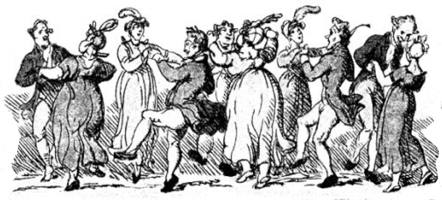
|
The Society of Folk Dance Historians (SFDH) Country Dance
[
Home |
About |
Encyclopedia | CLICK AN IMAGE TO ENLARGE |

|
BACKGROUND
Information: A dance family
The English social dance tradition is not all Playford-style Country Dances. These latter actually went out of fashion in England by the late 1820s when quadrilles and couple dances became the vogue.
Stuck in a historical social timewarp, the lowland Scotts carried on with country dances long after they had been dismissed as old-fashioned by the English, much like the Irish did with the quadrilles half-a-century later.
It's not quite as simple as "one dance style goes out, another dance style comes in, and the first dance style immediately vanishes." For example, I recently acquired a 1920s English social dance manual with instructions for the Lancers, in addition to the Lame Duck Waltz, the Foxtrot, etc.
–Fran Grimble.
Now-a-days English country dances – as promoted by EFDSS, CDSS and – yes – RSCDS (since until Jean Milligan in the 1920s stuck her oar in, all Country Dances in Scotland were generically described as 'English') are pure reconstructions and stylisations from numerous printed sources. The styles in which English country dances are danced today – in England, Scotland, Wales or the United States, etc., bear no relationship whatsoever to the originals – simply because we don't know what the original styles were, the social climate is totally different, the social mores are different, dance costumes are different, the music is different, the instruments are different, etc., etc.
Depends on what historic period you're talking about. A good deal of historic dance research has been done since the Cecil Sharp style, etc. was established. There are a fair number of surviving original sources on 18th-century and particularly, early 19th-century country dance, enough to allow accurate reconstructions. These are not the tradition in the modern Scottish and English country dance communities though. I think this is not because knowledge of the original styles is unavailable, but because the modern (by which I mean Cecil Sharp, etc.) reconstructions have become a new tradition. Also the modern reconstructions may fit better into the modern social climate, but I'm not sure about that. They are generally easier to dance than the original styles.
–Fran Grimble
There is an amazing dearth of knowledge and research about real English social dancing, be it historical, old time, set, new vogue, community, folk, modern cèilidh, etc., etc. on this newsgroup and indeed in the United States as a whole.
–C. J.Brady.
Other names: American Contra, English Country Dance, Scottish Country Dance, Australian Bush Dance, and Australian Colonial Dance.
DOCUMENTS
- Australia, a country.
- Cecil Sharp, an article.
- Contra, a dance family.
- Country Dance and Song, a book.
- Country Dance and Song Society, an organization.
- Country Dance Book, a book.
- Europe, a region.
- Scotland, a country.
- United States, a country.
This page © 2018 by Ron Houston.
Please do not copy any part of this page without including this copyright notice.
Please do not copy small portions out of context.
Please do not copy large portions without permission from Ron Houston.